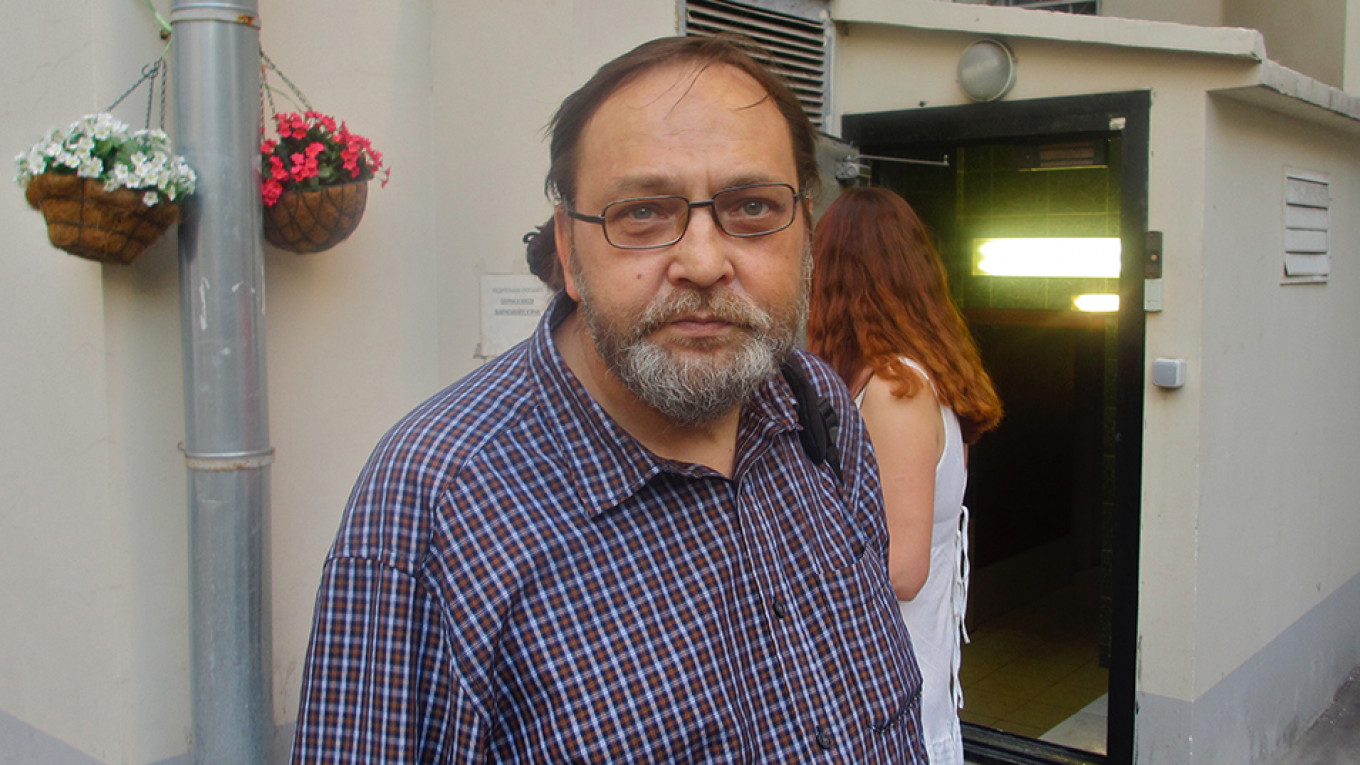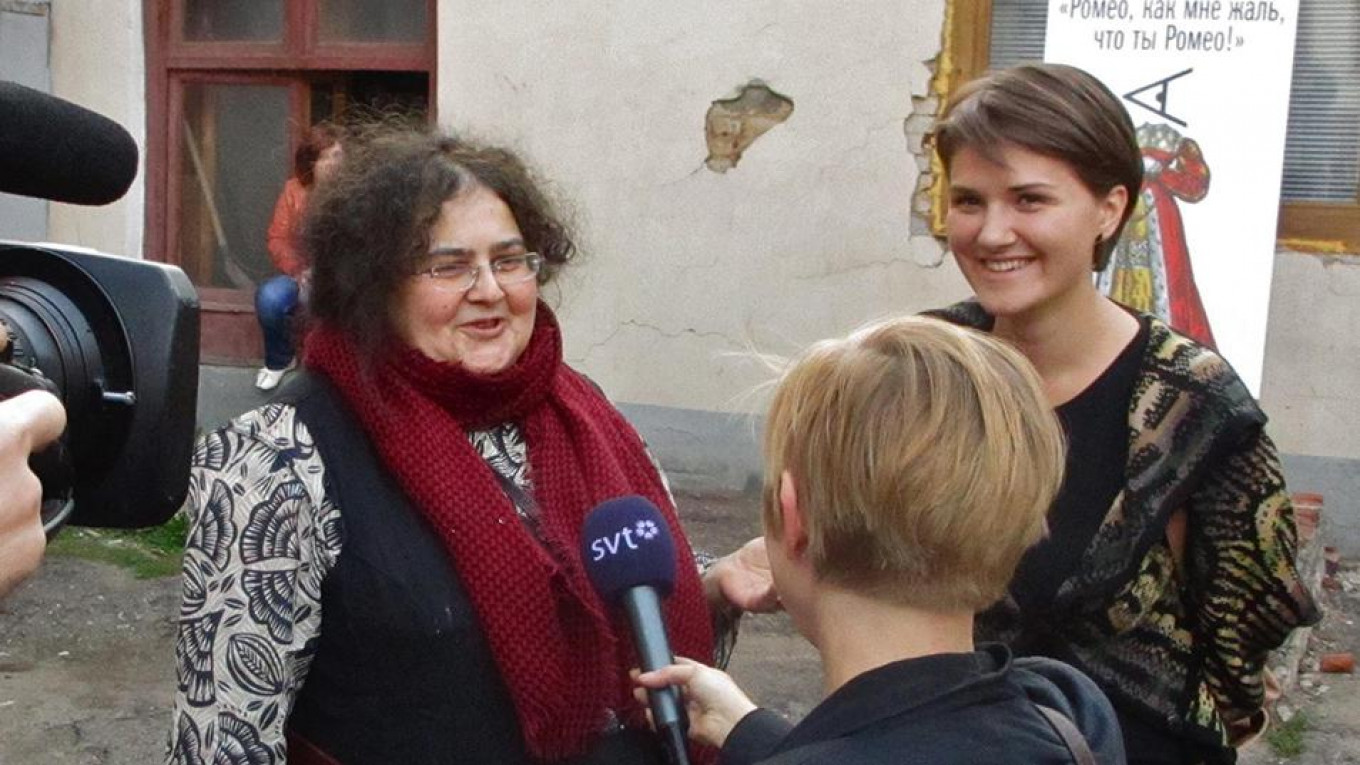When playwright, director and Teatr.doc founder Mikhail Ugarov died at the age of 62 in early April, many people said it was the end of an era.
But on Wednesday when the news got out that Yelena Gremina, Ugarov’s wife and co-founder of Teatr.doc, died at the age of 61 of kidney and heart failure, an era did come to an end.
This era of Teatr.doc, the era of “new Russian drama,” the era of the theater “where no one acts” — as Ugarov and Gremina used to say — is now part of the past.
A Theater Where No One Acts
Teatr.doc was officially founded by a large group of like-minded playwrights and directors in 2002. But the shining lights, the dual engines, the double rudders were Gremina and Ugarov. He took on the duties of artistic director while she settled in officially as the theater’s managing director. But that doesn’t describe their roles.
It was a badly kept secret that Gremina almost single-handedly kept the theater alive financially, pouring in large amounts of money that she earned writing TV screenplays.
In fact, Gremina and Ugarov were the brains, the brawn and the twin hot hearts of Teatr.doc. Their efforts changed Russian theater.
Doc, as everyone calls the playhouse, was a thorn in the side of tradition right from the beginning. Within a few years it was a thorn in the side of a government, which began taking extraordinary measures to shut it down.
Conservative theater-goers did not like the “uncouth” performances that Doc put on in the early years — tales of homeless people, criminals, unwed mothers in prison, factory workers, and the like. These new plays, often written under the tutelage of Gremina and Ugarov, brought a whole new language to the Russian stage. These characters did not speak like professors, journalists or professional writers, they spoke like any worker or homeless person might speak.
Arguments raged in theaters, in the press, in corridors — what is Teatr.doc doing to the Russian language and the Russian stage? Will we survive it? Horror, shame, and down with Doc!
Critics accustomed to the carefully enunciated Russian language employed at the Moscow Art Theater and the Maly Theater were disgusted at Doc, where they’d hear young actors mumbling or chewing up their words as most young people do.
Then a little miracle began to happen. Other young people found the theater and they began coming in droves. Some wanted to act there; others wanted to write. But most just wanted to come and see the world that they knew and understood reflected in a theater performance.
A Challenge to Power
Doc had a social conscience from the start. By the end of the new century’s first decade, that had turned to political activism. With Gremina writing and Ugarov directing, Doc put on a play called “September.doc” that grappled with the social and political forces that led to the Beslan school massacre.
What the show lacked in theatrical excitement, it made up for in courage.
When muck-raking attorney Sergei Magnitsky died in prison in late 2009 under highly suspicious circumstances, Gremina and Ugarov struck again.
Gremina wrote a play called “One Hour Eighteen Minutes,” detailing the criminal negligence that led to Magnitsky’s death, and Ugarov staged it, all within six months of the event.
Understanding that the authorities would be upset with “One Hour,” no one who worked on that project accepted an honorarium or pay. It was a statement by Gremina and Ugarov that their theater could not be bullied, and they could not be bought.
Gremina, who had an impish sense of humor and always seemed to know a little more than everyone else around her — Ugarov included — loved to answer people’s questions about how Doc could get away with taunting the government with their shows. Partly feigning naivete, partly owning it, she would say, “The government can’t close us down because we aren’t a government theater. We are a private theater. We are independent.”

A Challenge Accepted
But independence comes at a price. As the Russian government took an increasingly harsh stance against the Maidan protests in Kiev in late 2013, Doc found itself in an awkward position.
Doc regularly hosted evenings providing information about protest movements of all kinds — from Pussy Riot to the situation in Ukraine — and the Moscow municipal government began targeting Doc. First they were forced to put in a new door to comply with fire regulations. Then they were accused of violating zoning laws by putting in the door.
In December 2014 during a screening and discussion of a film about Maidan, the authorities raided the theater. Doc was given its eviction notice from its space near Pushkin Square shortly thereafter.
What the authorities did not expect was that Gremina had no intention of backing down. She defiantly declared that Doc could be evicted, but it could not be closed.
Backed by an army of supporters, Doc found a new space across the city, rented it, renovated it and reopened to a packed hall on Feb. 14, 2015. It was a night of triumph. I will never forget how Gremina slipped quietly into the last row and watched the opening ceremonial performances with a shy and sly grin on her face.
Moreover, Gremina kept holding officials’ feet to the fire — by this time, even more than Ugarov, she was pushing the theater ahead. On the anniversary of the notorious May 6, 2012, protests on Bolotnaya Square, Doc opened a show called “The Bolotnaya Case,” which detailed the tribulations of the defendants and their family members.
As policemen swarmed around the theater, Ugarov looked on in cold consternation, while Gremina wore a huge — I would even say impertinent — smile, as she gave upbeat interviews, greeted guests, and generally reigned supreme.
It was more than the authorities could take. They once again had Doc evicted.
Gremina’s response was astonishing. Within two weeks she had reopened Doc in the refurbished basements of a sprawling apartment complex not far from the Kursky train station. This time she rented two spaces and the theater continued its life virtually without skipping a beat, only now with twice as many stages.
A Living Theater
Like any living organism, Teatr.doc changed, even drastically, over the years. What never changed was the trust and the love that its audience and its creative community felt for it. This was a deep affection and respect that extended to Gremina and Ugarov personally. For tens of thousands of people all over the world, they were the theater they created, and it reflected them in every way.
What happens to Teatr.doc now? As Mikhail Ugarov was being laid to rest, rumors swirled that the residents of the apartment building housing Doc No. 3 were going to end the lease agreement. Indeed, Gremina soon announced that Doc was, again, looking for another home.
Many brave words are being spoken today, many calling on the Moscow theater community to keep Doc from fading away. But without Gremina and Ugarov to back them up, there is no telling what will happen.
What is certain is that the Gremina-Ugarov era of Teatr.doc is over. It’s history — literally. It changed Russian theater, as historians will now begin to write.
In one of her last comments on Facebook, Yelena Gremina asked people to stop sending condolences. “I was very, very lucky,” she wrote. “We were too different, but I met him, we recognized each other, and we chose to be together.”
As for the impact of Doc, Gremina wrote, “I probably wasn’t alone in being lucky. It changed the lives of many, it taught them and it helped them.”
Was the battle of making and sustaining Teatr.doc too much for these two individuals, both of whom were, at heart, as warm and welcoming as teddy bears? I don’t know. I do know that the battle they fought was real and hard, and that together, they created Russia’s first-ever truly socio-political theater, a theater that had the nerve to stand tall and speak truth to power.
John Freedman is a writer, translator and specialist in Russian theater and drama based in Moscow. He was the theater critic for The Moscow Times for over two decades.
A Message from The Moscow Times:
Dear readers,
We are facing unprecedented challenges. Russia's Prosecutor General's Office has designated The Moscow Times as an "undesirable" organization, criminalizing our work and putting our staff at risk of prosecution. This follows our earlier unjust labeling as a "foreign agent."
These actions are direct attempts to silence independent journalism in Russia. The authorities claim our work "discredits the decisions of the Russian leadership." We see things differently: we strive to provide accurate, unbiased reporting on Russia.
We, the journalists of The Moscow Times, refuse to be silenced. But to continue our work, we need your help.
Your support, no matter how small, makes a world of difference. If you can, please support us monthly starting from just $2. It's quick to set up, and every contribution makes a significant impact.
By supporting The Moscow Times, you're defending open, independent journalism in the face of repression. Thank you for standing with us.
Remind me later.







